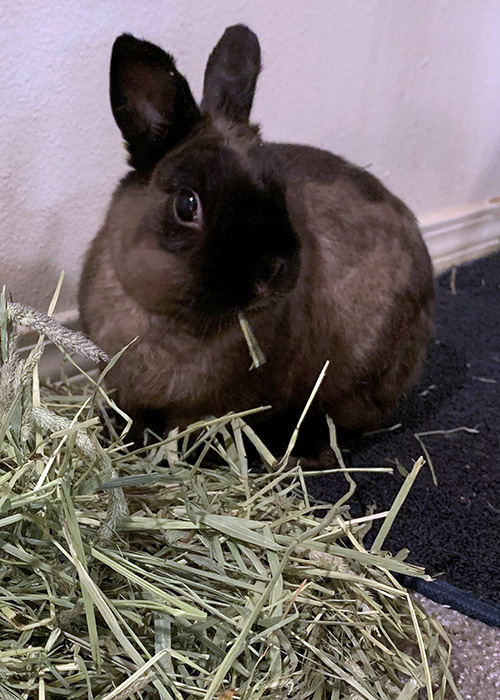
Good nutrition is vital to maintain rabbit health
Wednesday, March 6, 2019
Rabbits are among the most common pets in the United States. Quiet and friendly, they make great companion animals. As herbivores, their gastrointestinal (GI) tract is specifically adapted for a plant-based diet. Although preventable, improper nutrition is one of the most common causes of disease in pet rabbits.
A rabbit’s overall digestive health depends on a high-fiber diet, which is critical to stimulate and maintain GI motility. The best source of rabbit fiber is grass hay. Hay and fresh water should be available to your rabbit at all times.
A diet too low in fiber or too high in carbohydrates can lead to gastrointestinal ileus, a potentially deadly condition in which the digestive system slows down or stops completely. An improper diet can also cause microbial overgrowth or enterotoxemia, which can lead to serious health problems for your rabbit.
Poor nutrition can also cause many other diseases. A diet deficient in hay can contribute to dental disease. Rabbit teeth grow continuously. Growth is controlled by chewing, which helps maintain proper teeth height and shape. Poor teeth alignment and lack of normal chewing can cause teeth spurs. Sharp spurs inside the mouth can injure the cheeks and/or the tongue, which may lead to discomfort or difficulty eating. Historically, these animals will exhibit a selective diet, where they start by refusing the hay while still eating softer foods like vegetables and pellets.
Hairballs are another common problem in rabbits whose diets do not contain enough hay. Rabbits are compulsive groomers. While they clean themselves, they ingest relatively large amounts of fur. Although cleaning themselves is normal behavior and desired, the ingestion of hair can lead to the formation of balls of hair and food inside the stomach, which can lead to an obstruction in the stomach. Hay, in addition to maintaining normal motility of the GI, helps move ingested fur through the GI tract without problems.
Improper diet may also cause issues in other major body systems including the urinary tract. A high calcium diet can cause “sludge” in the urinary bladder, stones anywhere in the urinary tract, and even calcification of soft tissues (e.g. kidneys).
A rabbit’s daily diet should consist of an unlimited supply of water and hay, greens and a small amount of fresh fruit. Commonly, rabbits prefer a water bottle but some rabbits prefer water bowls.
Always make changes to your rabbit’s diet slowly. As a rule of thumb, offer only one new item per week. If your rabbit develops a soft stool or diarrhea after eating a new fruit or vegetable, the problem should resolve within a day or two. If it persists, stop feeding that item and seek veterinary care.
HAY: The healthiest choice of hay for your rabbit is timothy, orchard grass, oat hay, or other mixed grass hay. Avoid alfalfa hay for pet rabbits because alfalfa is high in calories and calcium. Exceptions include growing, young rabbits (less than 6 months of age) and pregnant or lactating females.
GREENS: For every 2 to 3 pounds your rabbit weighs, offer 1 cup of greens per day. Use a variety of greens to supply a balance of nutrients. Some examples include spring mix greens, carrots, carrot tops, cilantro, collard greens, dandelion greens and flowers (without pesticides), peppers, kale, mint, mustard greens, peppermint leaves, radish tops, romaine lettuce (no iceberg or light colored leaf), and spinach. Very dark green vegetables, such as spinach and kale, contain high calcium and should be offered less frequently.
FRESH FRUITS AND VEGETABLES: Daily offer a small amount (1 tablespoon per every 2 to 3 pounds of your rabbit’s weight) of fruits and vegetables. These items are a much healthier choice than prepackaged treats and include kiwi, strawberries, blueberries, raspberries, blackberries, apple (no seeds or stems), pear, peach, papaya, pineapple, cactus, melons, bean or alfalfa sprouts, mango and cranberries.
PELLETS: While convenient, pellets are not an essential part of a pet rabbit’s diet. However, it can provide a good supplement for your rabbit. Avoid using pellets with seeds as it may lead to dental disease.
Many rabbits develop diarrhea or chronic soft stools if fed a diet high in pellets. If you wish to feed pellets, choose a brand with no less than 18 to 20 percent fiber that is low in protein, calories and fat.
In addition to a healthy diet, rabbits need daily exercise in a safe environment. Physical activity stimulates the GI motility and helps prevent boredom and some unwanted behaviors.
Remember, never switch a rabbit’s diet quickly. Introduce new diets over multiple days to avoid stomach upsets.
